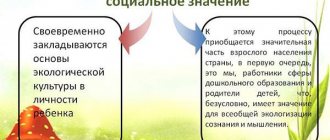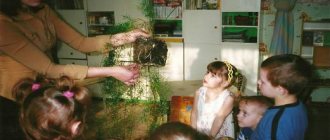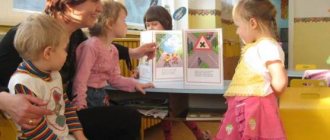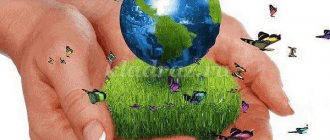From work experience: Environmental education of preschool children
Observations and experiments
, experiments allow you to enrich
the experience of a child - a preschooler
, stimulate mental activity, children's curiosity, independence, and satisfy the natural need for activity.
When organizing experiments and observations, it is important
that the child acquires a humane
experience
of knowing reality, so that these types of activities are safe not only for the child himself (which is, of course, very important, but also for living objects, i.e.
experiments
, observations and experiments must carry not only a cognitive load, but also
to cultivate
a friendly attitude towards living nature.
The group has a mini-library
.
It contains a variety of thematic literature, an encyclopedia of flora and fauna for preschool children
. I use the literature of famous children's writers, naturalists Prishvin, Bianchi in classes and thematic readings. In our free time, with the children, we learn poems about nature by our famous poets A. S. Pushkin, N. A. Nekrasov, I. A. Bunin and others.
Theatrical activities
In my work
I widely use folklore.
The wisdom contained in fairy tales, nursery rhymes, and riddles educates children
to expressive words, teaches goodness, love for their homeland and native nature.
Children love to participate in the production of environmental performances (for example, participation in a theater project for a kindergarten, a production about the friendship of animals based on the fairy tale “Teremok”)
. This helps to teach basic knowledge in a playful way.
Ecological holidays
To consolidate knowledge and impressions gained on walks, excursions, and classes in kindergarten, environmental holidays
, leisure activities, quizzes:
“The Earth is our native home”
,
“Flower Ball”, “Around the World”, “Spring has come”, etc.
One of the forms of environmental education
are holidays and entertainment.
The role of holidays and entertainment is to have a strong impact on the emotional sphere of the child’s personality. What is important in such holidays is not so much the reproduction of
familiar pieces of music, poems, games, or guessing riddles on natural themes, but rather the involvement
of children
in experiencing events, in awareness of
environmental problems
accessible to
children’s
.
In the course of the plot of a fairy tale played out by children, a separate episode. I try to evoke in children
the experience of humane feelings, sympathy, a strong desire to help the characters or solve a problematic situation.
Forms of work with parents
Environmental education
should not be limited to kindergarten.
I try to maintain continuity with my family. Since working
with parents is one of the components
of the work of a preschool institution
.
When working with parents on environmental education of children,
we use both traditional forms (parent meetings, consultations, conversations), and non-traditional ones
(business games, direct telephone, round table, discussions)
.
Environmental education of preschool children
CONTENT
| Introduction | 3 |
| Chapter 1. The process of forming the ecological culture of preschool children. | 7 |
| 7 |
| 15 |
| 21 |
| 25 |
| Chapter 2. Pedagogical conditions for the formation of ecological culture in preschool children. | 34 |
| 2.1. The developing environment and its role in the formation of environmental preschoolers' cultures. | 34 |
| 2.2. Inclusion of preschool children in environmental activities as a condition for the formation of environmental culture. | 37 |
| 2.3. Interaction between preschool educational institutions, children and parents as a condition for the formation of ecological culture in preschool children. | 40 |
| Chapter 3. Study of the formation of ecological culture of older preschoolers in the conditions of a modern preschool educational institution. | 46 |
| Conclusion. | 54 |
| Bibliographic list. | 57 |
| Applications. | 60 |
Introduction
On our planet, there have recently been serious violations of the mechanisms of self-regulation of systems at different levels, including the biosphere. The reasons for this are seen, among other things, in the ecological illiteracy of a person who relates to the surrounding world in a consumerist manner, taking an anthropocentric position in relation to nature (Anthropocentrism (from the Greek άνθροπος - man and Latin centrum - center) - an unscientific idealistic view, according to which man is the center Universe and the purpose of all events taking place in the world) position. That is why the tasks of changing a person’s worldview and the ecological development of a child seem to be a priority.
As practice shows, despite significant progress in environmental education of the population, the level of environmental culture of most people remains insufficiently high.
Consequently, in the current circumstances, environmental education of preschool children is of great importance, and the last two decades have been the period of formation of the environmental educational space and the development of new concepts - “ecological consciousness”, “ecological thinking”, “ecological culture”.
Long-term study of environmental problems in preschool education allowed researchers to define the concept of environmental culture. According to I.D. Zvereva, I.T. Suravegina, the ecological culture of the individual is built on the basis of understanding the laws of living systems and respect for life, and its main indicator is social and individual responsibility for events occurring in nature and people’s lives.
A. A. Parakhin (2001) defined the ecological culture of an individual as “a set of views, knowledge and beliefs that reflect the “society-nature” system and are aimed at a reasonable, prudent attitude towards it, active action in its defense, and, consequently, the formation ecological consciousness." At the same time, the conditions under which the formation of an ecological culture occurs most effectively have not yet been clearly identified.
Consciously - the correct attitude is developed under the condition of close contact and various forms of interaction of the child with the plants and animals in his environment. This is where a specific feature of environmental education for preschoolers emerges - the child’s direct contact with objects of nature, “live” communication with nature, observations and practical activities to care for them, and comprehension of what he saw in the process of discussion with adults. Cooperation, thanks to which mutual understanding, sympathy and harmony develop, so necessary in the formation of an ecological culture, can most effectively be manifested by repeated joint activities of an adult and a child, united by the achievement of a common goal. During this process, an adult, in a developing ecological environment, “forms in children basic scientific knowledge about nature, maintains interest in understanding the world around them, teaches them to see the wonderful in the ordinary, and the unusual in the familiar. In a word, it instills in children’s minds the feeling of the world around them as home,” writes T. Zenina (2000).
The purpose of this work is to study the pedagogical conditions that influence the process of formation of the ecological culture of children of senior preschool age.
The object of the study is the formation of the ecological culture of preschool children.
Subject: pedagogical conditions for the formation of ecological culture in children of senior preschool age.
Hypothesis - the process of forming an ecological culture in preschool children will be effective if a number of conditions are met, namely:
- creation of a developing ecological environment;
- inclusion of the child in the environmental activities of preschoolers;
- interaction with parents.
We set the following tasks:
- To reveal the essence, content, means and methods of forming the ecological culture of preschool children.
- Consider the formation of the foundations of ecological culture as one of the tasks of educating preschool children.
- To identify pedagogical conditions that contribute to the formation of an ecological culture in preschool children.
- Taking into account the identified conditions, draw up a long-term plan for environmental and pedagogical work with children of senior preschool age.
In the process of working on the problem, theoretical research methods were used: analysis of psychological, pedagogical and methodological literature, methodological documents, modeling. Empirical research methods were used: testing, questionnaires. A comparative analysis of the results was carried out.
The research was carried out on the basis of a preschool educational institution in the village of Rybnoye with children of the older group.
When writing our thesis, we used the following concepts.
Environmental education of preschoolers is an introduction to nature for preschoolers, which is based on an ecological approach, in which the pedagogical process is based on the fundamental ideas and concepts of ecology.
(Nikolaeva S.N.)
Ecological knowledge is information about the relationship of plants and animals with their environment, their adaptability to it, “about man as a part of nature”; on the use of natural resources, environmental pollution, etc.
(Nikolaeva S.N.)
An individual’s ecological culture is a set of views, knowledge and beliefs that reflect the “society-nature” system and are aimed at a reasonable, prudent attitude towards it, active action in its defense and the formation of environmental consciousness.
(Parakhin A.A).
An ecological worldview is a product of education; its formation occurs gradually over many years of a person’s life and learning.
(Nikolaeva S.N.)
Ecological space is a small area or separate room occupied by natural objects and having a specific functional purpose.
(Nikolaeva S.N.)
The environment (developmental subject) is a system of material objects of a child’s activity, functionally modeling the content of his spiritual and physical development.
(Novoselova S.A.)
Chapter 1. The process of forming an environmental culture
1.1. The essence of ecological culture
Environmental problems and the need to overcome them have given rise to a new direction in education - environmental. It is necessary to take into account that environmental education is not a part of education, but a new meaning and goal of the modern educational process - a unique means of preserving its development of humanity and the continuation of human civilization. (Yagodin G., 2001)
The next two decades are the period of formation of the ecological space, when the search for effective methods and conditions of education is carried out, technologies for teaching and educating children and youth are created. This is evidenced by the Recommendations of the parliamentary hearings “Problems of environmental education and training in Russia dated September 22, 1998.” Among which are the following:
- develop a unified national strategy for environmental education and awareness, taking into account the continuity of different stages of education and awareness, the specifics of various educational institutions and structures;
- consider environmental education of preschool children as a priority link in the system of continuous environmental education, a necessary condition for the sustainable development of the country, development and improvement of continuity between all spheres of social development of the individual (family - kindergarten - school - university - professional activity);
- develop recommendations for the creation of curricula, educational projects, educational and methodological materials, models of environmental education in the system of training and retraining of personnel: educational, additional, professional additional education; environmental education of the population.
Due to the worsening environmental problems, they have become the center of attention of various organizations and the media. At the moment we are talking about general environmental education, since its goal is to form an individual’s environmental culture.
As Sitarov V.A (2000) notes, culture is usually defined by contrasting it with natural phenomena, since “one of the most important manifestations of culture is the imprint of the conscious activity of the subject, in contrast to the natural existence of natural bodies.” However, in reality, in the process of the evolution of society, their increasing interpenetration and interdependence arises.” Culture is a manifestation of conscious activity; it “characterizes the degree of freedom of the subject in relation to natural and social necessity.”
Many years of studying the problems of environmental education allowed researchers to come to the definition of environmental culture, which, according to I.D. Zverev, I.T. Suravegina, should be associated with social and moral activities that raise the need to improve the environment. The ecological culture of the individual is built on the basis of understanding the laws of living systems and respect for life, and its main indicator is social and individual environmental responsibility for events in nature and people’s lives.
D.V. Vladyshevsky connects the essence of ecological culture with the management of natural resources, awareness of the dangers and inadmissibility of unrestrained use of the planet’s resources, and with the transition to national conservation of nature. And this should be associated with self-restraint of personal consumption and the search for optimal standards of industrial consumption.
No less important is the opinion of B.S. Kubantsev on environmental culture. He speaks of the need to reorient the anthropocentric thinking dominant in the thinking of his compatriots, when man is in the center, to ecological biocentric thinking, when man will be
consider yourself equal to nature. Such thinking can be formed on the basis of a deeper study of the objective laws of living nature than is currently the case.
Likhachev B.T. considers ecological culture as a derivative of ecological consciousness. It should be built on environmental knowledge and include a deep interest in environmental activities, its competent implementation, and a wealth of moral and aesthetic feelings and experiences generated by communication with nature.
Throughout the last years of the past century, the search and research of specialists in the field of environmental education continued - the concept of environmental culture was developing. Among philosophers, educators, psychologists, culturologists, ecologists (N.N. Moiseev, S.N Glazychev, B.T Likhachev, S.V Alekseev, N.M Mamedov, I.D Zverev, I.T Suravelena, L.V Tarasov , A.D. Ureul, etc.) an understanding of this phenomenon has developed - the understanding that at the stage of civilizational shifts, rapid planetary changes, it is the ecological culture that should become the core of the human personality that can save the planet, humanity as a whole, and bring it to a new round of development. The concept of ecological culture begins to be considered from a cultural perspective; qualities are introduced into it that make it possible to make it a phenomenon of general culture; two processes are intertwined in it: the education of a person and his formation as a sociocultural individual.








